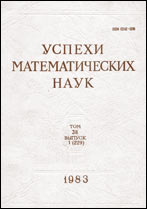|
This article is cited in 73 scientific papers (total in 74 papers)
Indecomposable representanions of the Lorentz group
I. M. Gel'fand, V. A. Ponomarev
Abstract:
Let $L$ be the Lie algebra of the Lorentz group or, what is the same, of the group $SL(2,C)$. We denote by $L_k$ the Lie algebra of its maximal compact subgroup, that is, of $SU(2)$. Let $M_i$ be the finite-dimensional irreducible $L_k$ modules (the finite-dimensional representations of $L_k$). Consider an $L$-module $M$. The authors call $M$ a Harish–Chandra module if, regarded as $L_k$-module, it can be written as a sum
$$
\displaystyle M=\bigoplus_i{M}_i
$$
of finite-dimensional irreducible $L_k$ modules $M_i$. Here, for each $M_{i_0}$, only finitely many $ L_k$-submodules equivalent to $ M_{i_0}$ are supposed to occur in the decomposition of $M$.
A Harish–Chandra module is called indecomposable if it cannot be decomposed into the direct sum of $L$-modules. In this paper the indecomposable Harish–Chandra modules over $L$ are completely described. We find that there are two types of indecomposable Harish–Chandra modules. The modules of the first type are the non-singular Harish–Chandra modules and are defined by the following invariants: an integer $2l_0,$ ($l_0\geq0$), a complex number $l_1$, and an integer $n$. The first two of these invariants are already known as invariants of the irreducible representations of the Lorentz group (see [2]).
The case of non-singular modules has been investigated earlier by Zhelobenko [3] from a somewhat different approach.
The case of singulat Harish–Chandra modules is of the greatest interest. The solution of this problem reduces to a non-trivial problem of linear algebra, which is investigated in detail in Chapter 2. The invariants of singular indecomposable modules are, as before, numbers $l_0$,
$l_1$, $l_0\ge0$, $2l_0$ integral and $2l_0-\vert l_1\vert$ integral.
However, instead of the one additional invariant $n$, there are now more invariants. Two types of singular modules are possible: those of the first and those of the second kind.
Singular modules of the first kind are characterized, in addition to the invariants $ l_0$ and
$l_1$, by a sequence of integers of arbitrary length. Singular indecomposable modules of the second kind are characterized by the following collection of invariants: the numbers $l_0$,
$l_1$ given above, a set of integers $j_1,j_2,\ldots,j_k$, an integer $q$, and a further arbitrary complex parameter $ \mu$. The presence of this parameter is particularly interesting, because it indicates the possibility of deforming an indecomposable module with $ l_0$ and
$l_1$ fixed.
The problems of linear algebra that are used in establishing the facts set out above are of independent interest in that the authors develop and use the apparatus of MacLane's theory of linear relations [4].
Received: 18.12.1967
Citation:
I. M. Gel'fand, V. A. Ponomarev, “Indecomposable representanions of the Lorentz group”, Russian Math. Surveys, 23:2 (1968), 1–58
Linking options:
https://www.mathnet.ru/eng/rm5609https://doi.org/10.1070/RM1968v023n02ABEH001237 https://www.mathnet.ru/eng/rm/v23/i2/p3
|


| Statistics & downloads: |
| Abstract page: | 1783 | | Russian version PDF: | 482 | | English version PDF: | 68 | | References: | 92 | | First page: | 5 |
|




 Contact us:
Contact us: Terms of Use
Terms of Use
 Registration to the website
Registration to the website Logotypes
Logotypes







 Citation in format
Citation in format 
